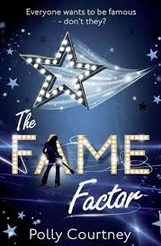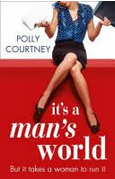Why One Author Chose Self-Publishing over HarperCollins: Polly Courtney

How can a first-time, self-published author gain the attention of the BBC and the Times? And after such a coup, what can go wrong when you join a big publishing house?
Polly started out by self-publishing her first two books, and gained the kind of attention that makes PR firms swoon. She was interviewed by the BBC, Channel 4, and was written about in the Times, Sunday Times, Guardian, and Observer, among others.
How did she set off such a media frenzy? Each book required a different approach, since they dealt with vastly different themes. Polly describes the doggedness and endless coffee meetings that jumpstarted the success of her first book, and the targeted approach, which launched her second.
Both titles were very successful, at a time when ebooks weren’t even around.
The good news kept coming: HarperCollins called, and signed Polly up for a three book deal. “I kind of felt at the time, as a lowly one-man band publishing her own books that this is flattering, a big publisher is interested in me.”
This should have marked a pivotal step in Polly’s writing career. One of the most commercial imprints at HarperCollins was her publisher. However, as she gradually came to realize, Harper wasn’t the ideal partner.
It started with the themes of her books. Harper wanted Polly to add ‘magical and mystical’ elements to her writing. She managed a compromise. It’s only in hindsight that she can say, “Had I had free rein over what I wanted to write about, I wouldn’t have chosen to write any of those books that I wrote with HarperCollins.”
The trouble didn’t end there. The covers and titles for her books were contractually up to HarperCollins. There was no collaboration.
Harper would present the cover and title with a ‘Ta Da’!
Unfortunately, the covers and titles were inconsistent with the content of Polly’s books, and even worse, were branded differently from one book to the next. Polly’s readership didn’t know whether she was a chick-lit author or a starry X-factor author.


Why didn’t they take the readers’ feedback seriously? Polly says, “I don’t think the concept of going out to test a cover and title on readers had actually occurred to them. I don’t think it’s something they do. I think they have a lot of people involved, sitting around the table there’s editorial and marketing and the art department, but the readers, which to me is the most important part of the chain – they weren’t present and they weren’t consulted. ”
On the day of her third book launch, Polly decided she’d had enough. She took to the podium to give her speech and publicly dropped HarperCollins. Some of the press had been primed beforehand, so they were in attendance to record the event. The cover of the Daily Mail read: “Novelist fires publisher for putting ‘fluffy and degrading’ covers on her books”.
Having self-published before, Polly realized it was a model she preferred, and did well in. With her upcoming book, Feral Youth, she has returned to self-publishing. Not only does it make sense for her to be in control of her own books, but if you're willing to take the initial risk, she discusses how it can be financially beneficial.
However, the biggest advantage to self-publishing for Polly isn’t the control or financial success it affords her: “The main difference … is the sense that I’ve actually got a team around me, which sounds weird because it seems like I should be isolated and on my own because it’s self-publishing … I feel like it’s us. When I talk to people about publishing the book, I keep slipping into saying we’re doing this and we’re doing that, which I never did while I was with the publisher.”
How’s that for ironic?
Thank you, Polly, for speaking so candidly about your experiences on both sides of publishing.




